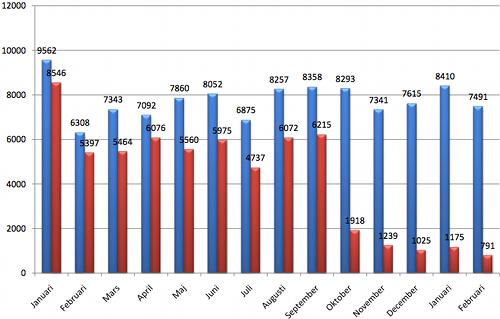If you have been blogging a few years, you may have noticed a change in the way other bloggers react to your content. Back then when I started, in 2004 and 2005, all you had to do is write a witty comment to some news story and five other bloggers would link to your post, possibly adding a few views of their own. Nowadays, you can spend weeks on research for a specific blog post and “all you get back” are a number of retweets, and maybe maybe one or two blog links. I’m not saying it’s a bad thing, especially for me who have an old blog with thousands of old links to it, I already have a high page rank. And it’s great that Twitter and Facebook have made it increadibly easy for your thoughts to travel across the web. But it was easier back then to get link love and, since a link is a “vote” on your content in Google, thereby building a good page rank for your blog.
So I will try to more often reward really good blog posts with a link back from my blog, not “only a retweet”.
“Good content deserves more than a retweet.”
Here is a good example that ties in well with the link love theme of this post. Simon Sundén, a great Swedish SEO expert, wrote a story the other day about how one Norwegian daily voluntarily turned down 5,000 natural inlinks per month. In short, Dagbladet.no used to use Twingly to show which blog posts link back to a given article. Since this concept is a win-win for both the paper and the blogger, many Scandinavian news sites have introduced Twingly. The news site gets lots of links and some traffic, while the blogger gets traffic back and some recognition.
What Sundén noticed was that Dagbladet.no stopped using Twingly some time late in 2009 and as you can see from the red columns in the graph below, the effect was that the number of inlinks per month dropped drastically from 5,000-6,000 to a measly 1,000. Meanwhile, competing daily VG.no kept Twingly and has enjoyed a steady level of links from bloggers (see blue columns below).
In the long run, VG.no will probably become a stronger site from a search perspective, compared to Dagbladet.no because bloggers are more likely to link to a similar article on VG.no than on Dagbladet.no.

Image credit: Simon Sundén.